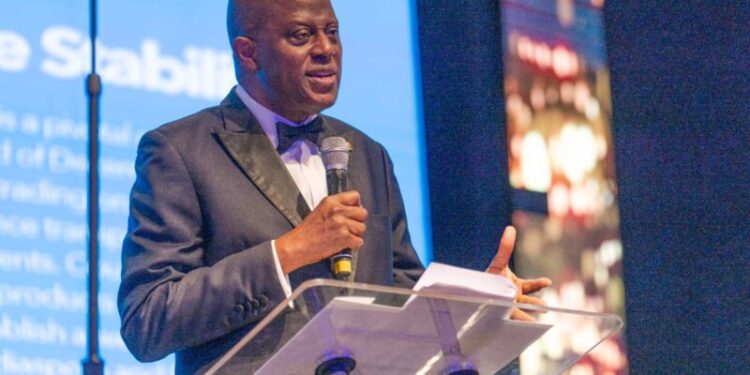The Governor of the Central Bank of Nigeria (CBN), Yemi Cardoso, has said the Federal Government has taken practical steps to revamp the Nigerian economy over the past one year.
Cardoso said this on Friday in Abuja, at Bankers’ Committee Retreat, with the theme: “Contract and Commitment to National Development and Economic Growth”.
He said that the country was making steady progress in various economic sectors,while urging both the public and private sectors to synergise and consolidate on the modest achievements.
“As we gather here, we are acutely aware of the challenges that have tested our nation in recent years; poverty, rising inflation, infrastructure deficits, insecurity, and unemployment..
“It is not all bleak. In recent times, we have witnessed significant strides made by both government and private partners in leveraging the immense opportunities before us to rewrite our nation’s story.
“However, while progress has been steady, it is evident that the road ahead remains long.
“The work before us requires focus, innovation, and unwavering resolve to reshape our collective
future,” he said.
He urged the Bankers” Committee to take bold steps by making meaningful contributions to the the economic growth and development of the country.
“This is why the theme of this retreat has been carefully chosen, to inspire deeper collaboration and renewed commitment as we strive to build a brighter future for ourselves and generations to come.
“Over the next few days, we will engage in meaningful discussions, share insights and experiences, and explore bold solutions to the pressing issues facing our nation,” he said. .
He tasked the committee be guided by certain considerations:
“What steps must we take to improve the business environment for all; large corporates, SMEs, and others?
“How can we better leverage public-private partnerships for infrastructure development?
“What are the most effective ways to close skill gaps in our workforce?,” Cardoso said.
He urged the committee members to also deliberate on how the country could foster an ecosystem that nurtures and supports innovation.
He said that they should also be concerned with how to reinforce social contract with the Nigerian people to build a more inclusive economy.
Also speaking, the Vice-President, Sen. Kashim Shettima, said the theme of the retreat established the link between growth and development.
Shettima was represented by Tope Fasua, Special Adviser on Economic Affairs, Office of the Vice-President.
According to him, whereas an economy may grow without developing given a certain finite period of time, yet there could be no real economic development without growth.
He said that the banks were pivotal to meaningful economic growth.
” Our banks are central to that growth in GDP output that every nation pursues on a minutely basis.
“This is in facilitating transactions, being receptacles for savings and investments, and in availing credits of all shapes and structures,’” he said.
He urged the banks to consolidate their role as catalysts for economic growth and development.
According to him, the development of banks should positively correlate with the development of the economy at large.
“The robust profitability that we have seen in that sector should reflect ,at least, marginally in the GDP growth numbers posted by the country at large.
” Indeed, we should be speaking about causality more than correlation. And we know that you are up to the task,” he said.
Shettima said that the Federal Government intended to shift from the usual suboptimisation that defined the Nigerian economy over the decades.
He said that the economy could be truly outstanding and can justify its prime position on the African continent and beyond.
” That is why some of the painful reforms are taking place at this time.
“Mr President, being the valiant leader that he is, has pressed on in favour of the long-term perspective, in spite of pushbacks.
” The key reforms pertain to the unification of the Naira rates in the official market and the closing of the gap with parallel markets, the
removal of fuel subsidies.
“There are also the reforms in the monetary policy areas, especially the treatment of ways and means advances, and the tax reforms.
“None of these reforms are easy to implement but we can see that in spite of all, they are beginning to yield results.
“We only ask that our people exercise a little more perseverance while the reforms take root,” he said.(NAN)











